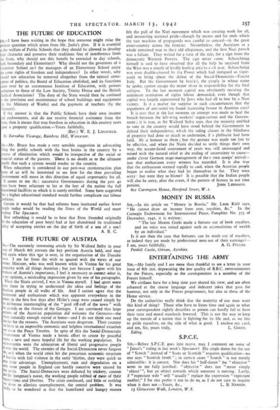THE FUTURE OF AUSTRIA
Suz,—The extremely interesting article by Sir Watford Selby in your nue of March 6th stresses the key position Austria held, and may hold again when this wjr is over, in the organisation of the Danube basm. I am far from the wish to quarrel with the views of our former Minister, who was well known while in Vienna for his great sYropathy with all things Austrian ; but just because I agree with his estimate of Austria's importance, I feel it necessary to conect.uthat is, la
any opinion, a misleading impression given by one of his paragraphs. When the Nazis arrived, I was in Vienna myself. I had spent some !tars there in trying to understand the ideas and feelings of the Austrian people in all walks of life. And I cannot agree that the ncitement and enthusiasm which was apparent everywhere in the streets in the first few days after Hitler's coup were caused simply by the deliberate intermingling of the " paid riff-raff of the town " with the crowds or the threats of the Gestapo. I am convinced that large 'talons of the Austrian population did welcome the Germans—the others naturally enough stayed at home—and I do not think one need bok far for the reasons. The Austrians were desperate. Their country had been in an impossible economic and helpless international situation ever since the Peace Treaties. In spite of this the Social-Democratic Government of Vienna made a heroic effort to create by peaceful alms a new and more hopeful life for the working population. Its achievements were the admiration of liberal and progressive people dl over the world. The enemies of the Social-Democrats never forgave 6is, and when the world crisis hit the precarious economic structure °Austria with full violence in the early 'thirties, they were quick to 167t their advantage. Unemployment; ruin and degradation on a Izile most people in England can hardly conceive were caused by that crisis. The Social-Democrats were defeated by trickery, cannon 41 the hangman's noose, the working people robbed of most of their organisations and liberties. The crisis continued, and sale or nothing s done to alleviate unemployment, the central problem. It was lordly to be wondered at that the humiliated and hungry masses felt the pull of the Nazi movement which was creating work for all, and reasserting national pride—though by means and for ends which the vast machine of propaganda was careful to conceal—in the great sister-country across the frontier. Nevertheless, the Austrians as a whole remained true to ther old allegiances, and the first Nazi putsch was a failure. They waited for a turn of the tide, for a sign from the democratic Western Powers. The sign never came. Schuschnigg himself is said to have observed that all the help he received from the West was a couple of kindly leading artic'es each year. Schuschnigg was even double-crossed by the Power which had intrigued so vigor- ously to bring about the defeat of the Social-Democrats—Fascist Italy. But the Government he headed, the peop!e in whose name he spoke, cannot escape the major share in responsibility for the final collapse. To the last moment capital was obstinately resisting the minimum restitution of rights labour demanded, even though that capital was largely represented by Jews who had all to lose by a Nazi victory. Is it a matter for surprise in such circumstances that the arguments of anti-semissm found increasing favour in Austrian ears?
It is true that at the last moment an attempt was made to heal the breach between the left-wing workers' organisations and the Govern- ment ; it is true, as Sir Walford Selby says, that the majority entitled to vote in the country would have stood behind the Government to defend their independence, which the ruling classes in the blindness of property had done so much to undermine, if a plebiscite had been held. Mc _e honour to them ; but the gesture was made too late to be effective, and when the Nazis decided to settle things their own way, the accumulated resentment of years was still unassuaged and mixed with the natural relief at die ending of uncertainty to cause— under clever German stage-management of ther own troops' arrival— just that enthusiasm every witness has recorded. It is also true that the enthusiasm seemed rapidly to cool, when the Austrian people began to realise what they had let themselves in for. They were sorry : but were they to blame? It is possible that the Indian people will also be sorry, after the event, if the pattern of history in our time
persists. JOHN LEHMANN. 6or Carrington House, Hertford Street, W. r.


























 Previous page
Previous page